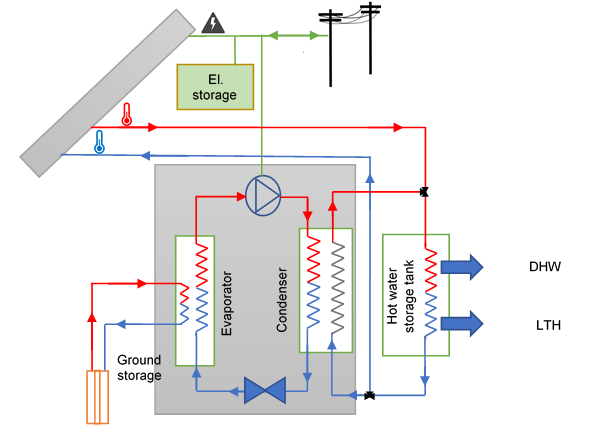Towards Sustainable (Fossil-free) Heating System in Small Residential Buildings
As a growing technology, the number of installed heat pumps in Europe was increased by 60% between 2014 and 2018, and European Heat Pump Association expects a doubling in the heat pump market by 2024. It is therefore a high priority to further increase the share of renewable sources in the heat pump’s configuration to increase the potential of energy savings and to reduce the greenhouse gas emission. The goal of this project is to study the performance of the PVT-assisted GSHP in new- and retrofitted single-family houses.
Funded by: Boverket
Time period: Sep 2019 - Dec 2020
Project members: Department of Energy Technology, KTH Royal Institute of Technology
Background
Sweden has ambitions to have 50 % more efficient energy use by 2030 compared with 2005, to have 100 % renewable electricity production by 2040 and to achieve zero net greenhouse gas emissions by 2045. In Sweden, the building sector is responsible for 40 % of the total energy consumption and represents about a third of CO2 emissions.
Heat pump has been known as one of the most efficient systems that extracts heat from renewable and low-quality energy sources stored in the ambient air, in the ground or in groundwater to meet the energy demand in buildings, which would drastically decrease CO2 emissions from building’s energy system. With respect to thermal efficiency of heat pump, two sides of energy supplier in thermal side and the energy distribution in demand side are highly coupled. Thermal efficiency of heat pump can be drastically improved by involving renewable sources from solar and ground to feed the evaporator in thermal side, and to use low-temperature distribution system, which works with a temperature close to the room temperature, in demand side. This efficient combination would lead to stable energy performance, low primary energy consumption, a high Seasonal Performance Factor (SPF) and high Coefficient of Performance (COP).
Aim and objectives
Our main ambition in this project is to develop an energy-efficient and sustainable heating system taking into account generation, storage and distribution parts in energy system. The studied system integrates photovoltaic/thermal (PVT) and ground-source heat pump (GSHP) in supply side with low-temperature heating (LTH) system in demand side. Using simulation tools and field measurements, we investigate energy usage, cost and environmental aspects of the proposed system in new- and retrofitted- single-family houses. For this purpose, three case studies with GSHP are chosen, and the application of PVT with GSHP is theoretically studied. LCC and LCA are used to assess the cost, and environmental aspects of the proposed system.

Outcomes
This project tends to:
- Develop an optimized research model of the proposed PVT+GSHP+LTH providing the greatest energy savings and lowest environmental impact with special focus on design and cost
- Evaluate the benefits and compare the performance of the proposed system with conventional GSHP
- Propose validated recommendations for future physical testing to verify the theoretical model and to prepare design and control guidelines based on climate condition, energy use and cost
